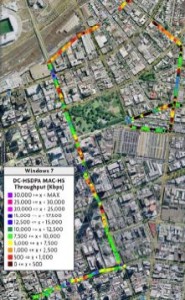 A new Signals Research study showed just how efficient wireless networks are and how the best speeds are achieved. Sometimes DC-HSDPA offered better download speeds than 4G LTE. However, the upload speeds for 4G LTE could not be beat.
A new Signals Research study showed just how efficient wireless networks are and how the best speeds are achieved. Sometimes DC-HSDPA offered better download speeds than 4G LTE. However, the upload speeds for 4G LTE could not be beat.
The report found that all technologies performed as expected and as advertised by the operators. They did notice faster 4G LTE speeds in the Houston which could be due to it being a new network with fewer customers. The chipset of the phone, modem or tablet does effect speeds.
AT&T's LTE network in Houston, was better than the Verizon Wireless network. The advantage can be explained and it will not be as evident in at least some other markets, while in some markets certain Key Performance Indicators KPIs) will favor Verizon Wireless.
They also disagreed with the notion that network loading is an issue at this time on the Verizon Wireless network - at least when it came to our test methodology and results. In fact they contend that the overall performance on both LTE networks could bey better in the future than it is today, even if LTE network traffic increases as expected. Much has to do with the hoped-for maturity of the LTE ecosystem and operator initiatives to improve the performance of their networks.
Latency is an area where all technologies/networks could show meaningful improvement - a mere 40ms of latency separates the best performing technology from the worst performing technology. They observed the lowest latency (27ms) on T-Mobile's DC-HSDPA network - during early morning rush hour traffic.
The performance of the network depends on the capabilities of the chipset/device, which in some cases they found to be lacking.
Once normalized for channel bandwidth and MIMO, not to mention taking into consideration network loading, the performance differences across all technologies were relatively modest in the downlink. In a few cases, DC-HSDPA outperformed LTE, even without making these adjustments and EV-DO Rev A outperformed HSPA+. Uplink throughput is an area where LTE generally has a big advantage over its peers.
Operators control their own destiny and the decisions that they make can greatly alter the performance capabilities of their chosen network technology. They found several key shortcomings in certain operator deployments which had an impact on performance relative to the capabilities of the technology.
Signals Research Group, LLC is a US-based research consultancy that is focused on the wireless industry.